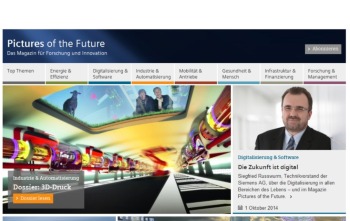A new digital world: Pictures of the Future online

The Siemens magazine for research and innovation, “Pictures of the Future”, is now available as high-quality online magazine. Now videos, image galleries, info-graphics, interactive 360-degree features are included – a clear advantage over a printed magazine.
The digital version also contains interviews with key experts, scenarios that look up to 45 years into our technology future, and loads of thought-provoking articles. Some 20 dossiers report on hot technologies ranging from 3D printing and Smart Data to electric mobility.
Newspapers and magazines are being read less in paper form and more and more on tablets, PCs, and smartphones. Accordingly, the editorial team has transformed “Pictures of the Future” (PoF) into an online magazine – with all the advantages that the digital world offers: New articles published several times a week, multimedia-based materials, text sections supplemented with videos, animated infographics, and new elements like interactive 360-degree features, for example, showing a view of the top of a wind turbine or a rocket launch or a look in the deep of the new Gotthard tunnel.
In addition, the magazine will be expanded in line with readers' information requirements. “Pictures of the Future” Digital will form the basis for other products, both in print form and, in the future, also as tablet and smartphone versions. Its contents will also be distributed through many other channels ranging from social media to Siemens internal and public media.
Digital first
A comprehensive overview with scenarios, analyses and features
As is usual in online magazines, PoF Digital will be subdivided into sections. These will not be called Business, Politics or Sports, but instead Industry & Automation, Digitalization & Software, Energy & Efficiency, or Health & Well-Being. Readers can subscribe to some or all of these sections, depending on their interests. Added value is offered by dossiers covering themes such as From Big Data to Smart Data, Additive Manufacturing, Medical Imaging, and Smart Grids and Energy Storage. Here are all information about key issues, technology scenarios and trends, specialized reports, interviews, and business analyses.
Goal is to give readers a comprehensive overview of each topic that is nonetheless as concise as possible. For example, after reading the Additive Manufacturing dossier, subscribers will know how this technology works in an industrial setting, the trends behind it, and what its status is at Siemens. The launch issue of PoF Digital includes 21 dossiers. About six more will be added every year.
Considering these developments, Pictures of the Future will continue to be the leading medium through which customers, business partners, technology journalists and interested parties can find out about innovations at Siemens. Available at http://www.siemens.com/pof (also with newsletter).
Media Contact
All latest news from the category: Corporate News
Newest articles

Magnetic Memory Unlocked with Energy-Efficient MRAM
Researchers from Osaka University introduced an innovative technology to lower power consumption for modern memory devices. Stepping up the Memory Game: Overcoming the Limitations of Traditional RAM Osaka, Japan –…

Next-Level System Security: Smarter Access Control for Organizations
Cutting-Edge Framework for Enhancing System Security Researchers at the University of Electro-Communications have developed a groundbreaking framework for improving system security by analyzing business process logs. This framework focuses on…

How Microbial Life Shapes Lime Formation in the Deep Ocean
Microorganisms are everywhere and have been influencing the Earth’s environment for over 3.5 billion years. Researchers from Germany, Austria and Taiwan have now deciphered the role they play in the…



